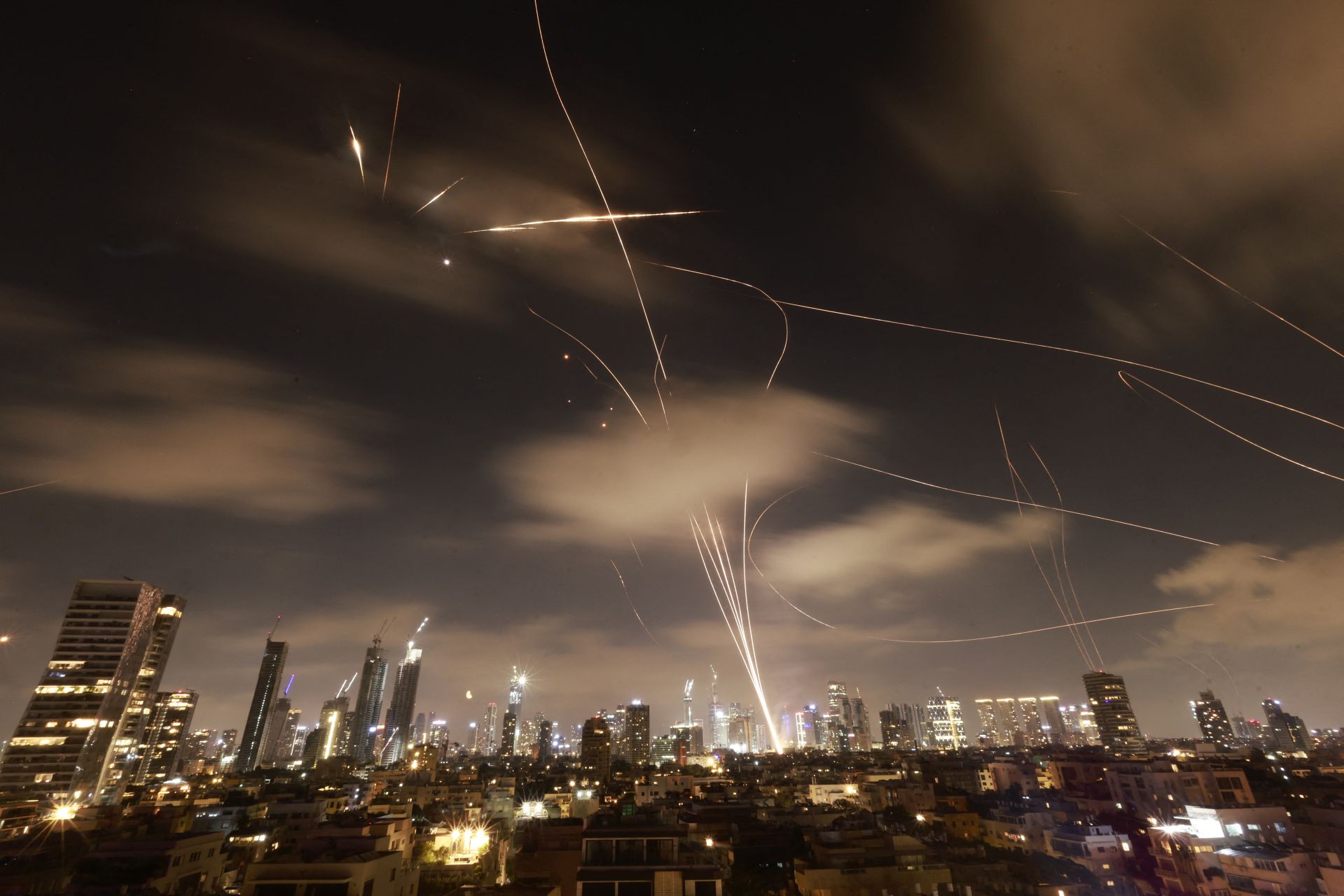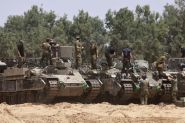- Home
- Middle East
- Day 6: Israel Strikes Key Iranian Sites, Tehran Fires Hypersonic Missiles

Israeli air defense systems are activated to intercept Iranian missiles over the Israeli city of Tel Aviv early on June 18, 2025. ©Menahem Kahana / AFP
The conflict between Israel and Iran entered its sixth consecutive day on Wednesday with no sign of de-escalation, as both countries exchanged fresh missile strikes overnight. Israeli warplanes targeted several high-value sites in and around Tehran, while Iran responded by launching hypersonic missiles toward Tel Aviv and warning Israeli civilians to evacuate.
Explosions were reported around dawn Tuesday in Tehran and its outskirts, including Karaj, following Israeli strikes that reportedly hit a key missile production center and an academy linked to the Islamic Revolutionary Guard Corps (IRGC). According to military sources relayed by foreign media, among the targets was also the Imam Hossein University, a known IRGC-affiliated institution on the eastern edge of the capital.
In what appears to be a coordinated warning ahead of the strikes, the Israeli military had earlier urged residents of Tehran’s District Eighteen - home to military installations and civilian neighborhoods - to evacuate the area, citing imminent danger.
One of the more strategic Israeli targets was reportedly a centrifuge production site in Tehran. The Israeli military stated that the attack aimed to disrupt Iran's ability to expand uranium enrichment for nuclear weapons development. These centrifuges are delicate machines used to enrich uranium, and damaging their production facilities could significantly slow Iran's nuclear progress.
Israeli forces said the latest round of operations involved over 50 aircraft and also included hits on several weapons manufacturing plants, including facilities for the production of components used in surface-to-surface missiles.
Iran Announces Using Hypersonic Missiles For The First Time
Meanwhile, Iran’s Islamic Revolutionary Guard Corps (IRGC) claimed responsibility for a barrage of retaliatory strikes, including the use of Fattah-1 hypersonic missiles a weapon unveiled in 2023 and promoted by Iranian media as a breakthrough in missile technology. The IRGC said the missiles were aimed at military and strategic sites in Tel Aviv and described the assault as the "11th wave of the proud Operation Honest Promise 3." It boasted that the Fattah missiles were “repeatedly shaking the shelters” in Israel’s commercial capital. While Iran hailed the launch as a "turning point," there have been no confirmed reports of casualties inside Israel. Analysts remain skeptical about the missile’s actual hypersonic capabilities.
Iranian media also reported the launch of a “swarm of drones” toward Israel. The Israeli military confirmed it intercepted at least two drones in the Dead Sea area overnight.
In a symbolic escalation, Iran’s Revolutionary Guards also issued an evacuation notice for neighborhoods in Tel Aviv - a rare move interpreted by observers as a direct psychological tactic amid fears of further missile strikes.
The Iranian Supreme Leader, Ayatollah Ali Khamenei, issued a defiant message across his social media platforms, including in Hebrew, declaring that “Iran will never compromise with Zionists,” and ominously stating, “the battle begins.”
Iran Arrests Five for 'Tarnishing' Country's Image
Iran said Wednesday it had detained five suspected agents of Israel's Mossad intelligence agency on charges of tarnishing the country's image online, Iranian news agencies reported.
"These mercenaries sought to sow fear among the public and tarnish the image of the sacred system of the Islamic Republic of Iran through their calculated activities online," the Tasnim and ISNA news agencies quoted a statement from the Revolutionary Guards as saying.
They added that the arrests had been made in the western province of Lorestan.
The authorities had appealed to the public on Tuesday to "minimise their use of equipment connected to the internet and to take appropriate precautions" online.
For their own safety, civil servants and their security teams have been banned from using any connected devices, including smartphones, watches and laptops during the Israeli air offensive.
State television appealed to Iranians on Tuesday to delete WhatsApp from their phones, charging that the messaging app gathers users' location and personal data and "communicates them to the Zionist enemy".
International Moves
On the international front, tensions are rising over the risk of regional spillover. U.S. President Donald Trump, who held an emergency meeting in the White House Situation Room, is reportedly weighing whether the United States should join Israeli strikes on Iranian nuclear sites, including the heavily fortified Fordow facility. Although no decision has been confirmed, reports suggest that U.S. military assets, including bomber aircraft and tankers, have been repositioned closer to the region.
General Asim Munir, Pakistan’s army chief, currently visiting Washington, is expected to meet President Trump later today.
Despite mounting international pressure for a ceasefire, both sides appear determined to press on. French President Emmanuel Macron called on Trump to lead diplomatic efforts, warning that regime change in Iran could plunge the region into chaos. China accused Washington of “pouring oil” on the flames, while Turkish President Recep Tayyip Erdoğan labeled Israeli Prime Minister Benjamin Netanyahu “the biggest threat to regional security.”
Impact on the Ground
The humanitarian cost continues to mount. Israel says 24 of its citizens have been killed since the conflict began, with hundreds more injured. Iran reported 224 fatalities, including senior commanders, nuclear scientists, and civilians, though that toll has not been updated in recent days.
In Tehran, long lines have formed outside bakeries and petrol stations as residents scramble to secure essentials. Many have begun fleeing the capital, with more than 700 foreign nationals evacuating through neighboring Armenia and Azerbaijan, according to Iranian government sources.
Amid the chaos, cyber warfare has also intensified. Iranian state media reported that a major cyberattack crippled Sepah Bank, one of the country's largest state-owned financial institutions.
The United States has temporarily closed its embassy in Jerusalem due to security concerns, though it has not announced plans to assist in the evacuation of American citizens from the region.
As Israel continues to target critical elements of Iran’s military and nuclear infrastructure - including the Khojir missile complex, a key ballistic missile site near Tehran - the scale of Iranian attacks appears to have diminished, possibly reflecting the effectiveness of Israel’s air campaign.
While both sides remain entrenched, the scope and direction of the conflict may be shaped in the coming days by decisions taken not only in Tel Aviv and Tehran, but also in Washington.
Read more




Comments